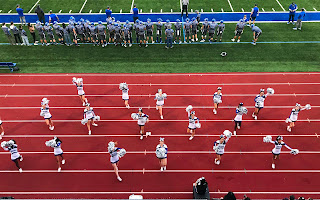Why Gardeners Are Hot
The "hot gardener" has been a trope in erotic fiction for a long time, ever since D.H. Lawrence wrote "Lady Chatterley's Lover" in 1928. With my new MILF erotica short story, I would like to add to this trope.
Nevertheless, as I have mentioned in the last two posts, I don't like Lady Chatterley as a character, and I dislike Mellors, her gardener, even more. She is a bored, listless, valueless human being with nothing better to do than just lounge around her huge house, while Mellors is this brooding, hulking, monosyllabic, brutish figure who's not exactly schooled in the finer points of female anatomy.
Even so, I have to accept that Mellors is the prototype. That doesn't mean I have to like the guy, though. I wish that Lawrence had created a better character for this trope - someone with an education, who could string two words together, and even manage a sentence if he tried really hard.
1928, huh? That says it all. The 1920's was a decade of decadence, luxury, and comparative sexual freedom for women. There was Mrs. Pankhurst, the First Wave feminist, back in the days when it was called Women's Liberation, a much more exciting name; there was Mae West, with her winking innuendo; there was HRH the Prince Edward, the Prince of Wales, going around seducing married women, like Freda Dudley Ward (and later, in the 1930's, Wallis Simpson, leading to the Royal Abdication of 1936); there was "The Great Gatsby". Yet I'm not entirely thrilled with the twenties as a decade, nor do I buy wholeheartedly that this was some sexy, fashionable, halcyon age of Rudolph Valentino silent movies, or "It Girls" like Theda Bara, Clara Bow or Louise Parsons, or figures like Tallulah Bankhead. Behind all this glamour and surface glory was an aching void - all of these people, real or fictional, were former Edwardians, who had grown up in the naive, innocent days of HM King Edward VII, who was a fun, jolly, colourful figure of joy, after the stuffy Victorian Age. Yet all these dreams had been brutally smashed to smithereens in the trenches of World War I, and now they hid their trauma in drug addiction, booze, pointless wild parties, sexual excess and social abandon. They were the Lost Generation. Theirs was an age of meaningless diversion from pain they couldn't bare to face.
So I feel unsatisfied with Lady Chatterley and Mellors. Lawrence lays on the social class distinctions way too thick for my liking, making such a big deal out of her aristocratic bearing and his thuggish status as a member of the uneducated working class. Sex between them is brutish, ugly, short, with no finesse. While some women might thrill to the dominance of such a man, I don't see why I need to put up with a near-Neanderthal lover just to get it.
Yet, despite Mellors' shortcomings, there is still something sexy about a man who works in the garden. From jokes like, "he's good with his hands", to the need to be strong, with a well-developed body, the feel of rough, calloused hands as a contrast to a woman's gliding, soft, smooth skin, the strength to throw her around the bedroom, the fresh sweat, the roll in the hay, the smell of freshly-cut grass, the hazy, lazy days of summer, the crunch of leaves underfoot in the autumn - all of these are great starting points for a hot tale of desire in the outdoors. Awesome.
I very much hope that Eddie Dalton, my male lead, can fulfill your secret desires for such a man; and I hope I've done a better job at creating a sympathetic character for him than D.H. Lawrence did with Mellors.
.jpg)



Comments
Post a Comment